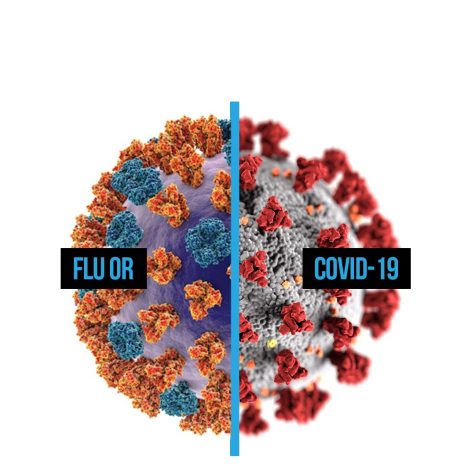JACKSONVILLE, Fla. – With flu season around the corner and a pandemic surrounding us, college students may question how to prepare for the upcoming months.
Influenza viruses, commonly known as the flu, are year-round. However, the virus peaks during the fall and winter seasons. As college students prepare to leave for holiday travels and this being the first flu season during a pandemic, health researchers are concerned for a massive wave.
People with diabetes, high blood pressure, kidney diseases, among other conditions, are more prone to getting both COVID-19 and the flu.
People can also carry both types of viruses at the same time.

Coinfection is not unheard of and is plausible as the weather gets colder. In August of this year, a journal reported by the National Center for Biotechnology Information (NCBI) detailed three cases under surveillance. The top symptoms were cough, fever, shortness of breath, and myalgia, a deep muscle pain.
All three patients, ranging in age from late 40s to early 70s, were discharged in stable condition. The report states concerns that though both COVID-19 and the flu are respiratory viruses, treatment varied to address the similar symptoms.
Various forms of medication treat these infections — however, differentiating the two viruses will prove to be a difficult task.
“Bottom line is, there’s not a great deal of distinction between the two,” UNF Student Health Services chief of medical staff Dr. Frederick Beck said. “They can behave virtually identically in terms of symptoms.”
Both the flu and the coronavirus can cause coughing, fatigue, pains, chills, and fevers, though the flu tends to induce higher temperatures. Both can also cause skin irritations and muscle aches.
Whether a person has the flu or not, it is encouraged to self-quarantine.
“We do want to put them into presumptive isolation,” UNF Director of Student Health Services Dr. Valerie Morrison said. “Whether it’s the flu or it’s COVID, we don’t want it to spread to the student body.”
Another concern health researchers have for the upcoming months are myths or misunderstandings that could do more harm than good.
Such as a flu shot will not help prevent coronavirus. Flu shots only help prevent influenza and not COVID-19, being that they are distinct types of viruses.
Another misconception is that if a person is negative for the coronavirus, it does not mean that they are not susceptible to getting the virus. Rapid testings are known for providing false negatives, which can further spread the virus.
Health researchers want to make sure that people do not need to go to work if they do not feel well. Some workplaces over the years have cultivated an expectation for employees to attend their job though they are sick, now with the pandemic, that mentality may end.
“People feel like they have to be present,” Dr.Morrison said, “even when they really should not be. It’s getting in that mindset that when you are sick, please stay home. […] We really want people to notice their symptoms and to say I need to stay away from other people, even if it’s not so bad.”
The best form of prevention is simple as social distancing, washing hands for the appropriate 2 minutes, and wearing masks correctly over the nose and chin.
For UNF students, completing the Osprey Safe App and completing the daily assessments before stepping on campus is essential to prevent spreading any type of virus.
__
For more information or news tips, or if you see an error in this story or have any compliments or concerns, contact editor@unfspinnaker.com.















